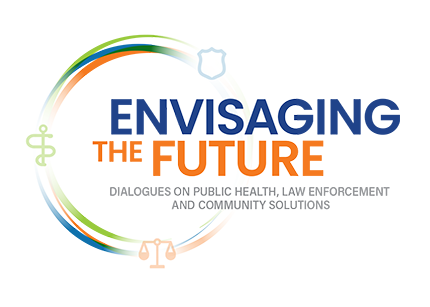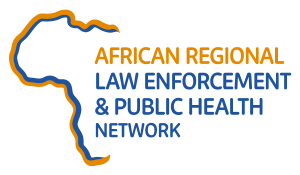Janine Ewen, a member of the Global Law Enforcement and Public Health Association (GLEPHA), is a leading public health professional/early career researcher in criminology; she is committed to supporting marginalised communities locally, nationally and internationally. Janine has assisted the Law Enforcement and Public Health Network since 2016 by presenting at their conferences; developing consultation work on the policing of vulnerable populations in Europe with international organisations, such as the United Nations Office of Drugs and Crime (UNODC); and helping to establish and co-facilitate Scotland’s and GLEPHA’s first gender, safety, and harm reduction programme. This early work was to set standards on needs-based and solution-focussed policing, in order to understand the actual needs of under-served populations, and to uphold key principles when working with vulnerable populations.
Janine started her life in Northern Ireland, where she came to understand the realities of the ethno-nationalist conflict. She was brought up in a community with substantial divisions and disadvantage, which she still reflects on to ensure we aim to transform for the better: her interest in policing started as a child, with direct experiences of the Police Service of Northern Ireland’s (PSNI) handling of domestic abuse. This exposed her to what happens when policing and protections fail – including being physically restrained by police officers, and witnessing the police giving inadequate support to her mother. Janine then moved to rural Aberdeenshire with her mother and brother, and lived for two years in a women’s refuge.
Janine has collaborated in several studies on policing domestic violence, and on the impacts of family violence on one’s life course. Her contributions on research participation have been published in Children and Adolescent’s Experiences of Violence and Abuse at Home, and she was recently published in the Research in Practice Network on exploring the impact of childhood violence through photographs. Furthermore, Janine has worked with, presented and trained social workers, lawyers, academics, police officers, and substance misuse workers, to improve public health support for young people who have experienced trauma. With her first-hand understanding of unhealed trauma and criminality/exploitation, Janine will soon be featured on the Contextual Safeguarding Network – on undertaking experimental creative research methods with young people, involving themes of safety, harm and place. Janine is an advocate for young boys who experience adversity, irrespective of criminality, to create a safer society; she has recently published a review of Dr Jade Levell’s book, Boys, Childhood Domestic Abuse and Gang Involvement: Violence at Home, Violence On-Road, in the first edition of Gender and Justice.
Janine’s experiences have also helped Police Scotland to consider other problems such as breaches of confidentiality, as well as safety when in hiding from perpetrators. Janine and her family’s whereabouts were leaked by accident through manipulation tactics; the perpetrator came to Scotland to look for them. This reminded Police Scotland’s Domestic Abuse Taskforce team of the dangers when perpetrators do not give up, and of the PSNI’s protection failings. Janine shared these experiences, along with advice for students and practitioners working in the areas of policing, vulnerability and harm reduction, at the Vulnerability and Policing Futures Research Centre. She also appreciates the importance of having trauma-informed care by professionals while going through the criminal justice system, as Janine and her brother’s testimony to the family lawyer was pivotal to her mother’s court case against her father. She was recently interviewed by the Law Society of Scotland on how what more can be done to better understand the realities of childhood domestic abuse.
Having been largely raised in the northeast of Scotland, Janine then supported and led several community-led projects and local charities that help women, young people, and children – including Grampian Women’s Aid. Janine’s early work focused on building holistic, trauma-informed support for young people experiencing adversity, including from family violence, harm reduction/drug use, and policing. One of her proudest achievements was developing a specialist service for children and young people dealing with the trauma of domestic abuse; she helped to secure funding for support workers, and to create a warm environment where children and young people can express themselves. Janine has also worked in victim support, and has collaborated directly with the Crown Office and Procurator Fiscal Service (COPFS), as well as specialist police force teams.
For decades, Janine has supported people involved in the illicit/underground economy. In the early 2000s, she witnessed first-hand the manifestations of peripheral criminal harm from the drug trade in northeast Scotland, and was instrumental in pushing for early harm-reducing and peaceful solutions in a climate of ideology and criminalisation. Janine has extensive experience in building public health/health needs assessments, police and partnership work, projects with local agencies, and setting up non-police-attendance events with public health/NHS workers (where criminalised people can discuss crimes committed against them). Much of this work has aimed to prevent people in the underground economy from relying on, or being taken advantage of by, criminal groups, against the background of heavy policing agendas. Janine recently published a template framework of a health needs assessment for GLEPHA, to show academics, practitioners and students how public health work with under-served populations can avoid becoming an enforcement-led agenda. She has also written open access and general advice on skills in developing public health projects. Janine is currently working with Dr Melissa Jardine on a new paper to enhance ethical practices in researching communities impacted by organised crime; some of this material has also featured in Policing Insight.
Janine’s main police advisory work has been with Scotland’s Domestic Abuse Taskforce Team, Human Trafficking and Prostitution Unit; she has also liaised with the Serious Organised Crime Taskforce. She has been a visitor to the Scottish Crime Campus, and has assisted Police Scotland’s major investigation team. Janine has also worked with the PSNI.
Janine has excelled in higher education, having gained several qualifications in advanced research methods, public health, criminology, sociology, and leadership and management – in many of these, she has earned a top distinction. She is keen to keep her academic learning interdisciplinary in nature.
Janine’s other harm reduction projects have included frontline work with NHS Tayside to set up ‘Healthy T’; this was a designated area at the Scottish festival T in the Park, which promoted wellbeing, sexual health and guidance, harm/drug use reduction, and the reporting of sexual violence and harassment. The project was awarded funding by the Scottish Government for four years. This work involved inter-agency working with health, police and welfare staff, to ensure that young people, in particular, had safe and positive experiences in a largely challenging environment.
Janine has also worked abroad; as well as consultation work, she was also invited to visit Brazil on three occasions – mainly Rio de Janeiro and Sao Paulo. Janine worked part-time in a public health project to steer young people away from gang-related crime and violence in urban favelas, through education and sports. She learned more about Rio’s new approach to tackling drug trafficking. Janine has been producing material from her fieldnotes, including producing visual material through the sensory criminology blog as an open access, imaginative and teaching resource for students who study criminology and social harms. She won an International grant to speak at a conference in Rio on urban change, unsettled communities and social injustices.
Janine has been awarded several scholarships to talk about public health, harm reduction and safety, including from the British Society of Criminology and she won a prestigious scholarship to attend the Global Health Post 2015 in Stockholm to contribute to the discussions which featured members of The Lancet and the World Health Organization (WHO)). She has presented at the Queen’s University Belfast, the London School of Hygiene and Tropical Medicine and will soon be doing more guest lectures and discussions for students working in policing and vulnerability.
Recently, Janine has helped to develop a new project on organised crime. She helped to develop an idea/project to determine the international risks of organised crime because of the introduction of two new Scottish freeports. This work is being supported by the National Crime Agency (NCA) and will hope to determine what implications County Lines Networks will have in this. She is also finishing a study on the inequalities of criminology knowledge production in Scotland.









